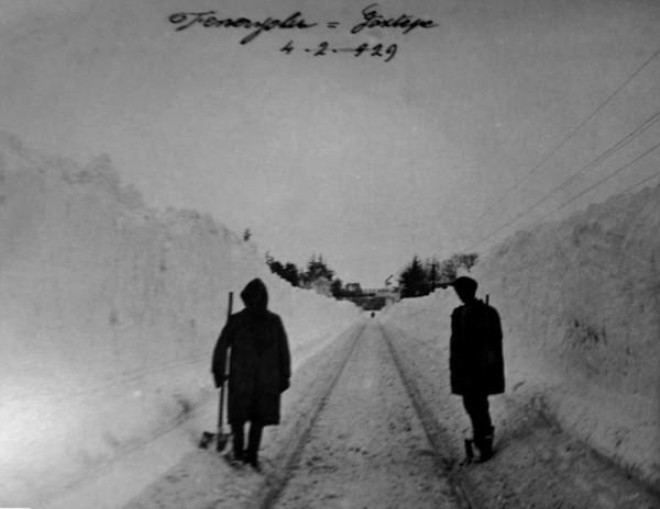türkçe links to original Turkish article
(Milliyet Newspaper, 1 March 2020)
Istanbul is one of the cities most affected by global climate change.
These years, winter temperatures are above normal in the 'megakent'
(mega-city) and this year, in particular, there's been hardly anything
resembling snow, other than a light sprinkling on 8 February.
On the first of March 91 years ago, though, the scene was quite different.
Large blocks of ice came down the Bosphorus from the north and people
could walk from one side of the strait to the other over the ice. There
were snow drifts reaching 5 meters in Erenköy and Göztepe.

Transportation was chaotic because of the cold spell that lasted from
2 February to 8 March in 1929, with ferry and tramway travel canceled
as the temperature dropped to minus 12 at night. On 1 March, the snow
accumulation in Taksim Square reached two meters and pedestrians
could pass only through trenches cut in the snow.
Bread sales went on the black market and finding coal and wood became
problematic. Capt. Fevzi Bey commanded a detachment that cleared the
snow from Bağdat Avenue from Kadıköy to Göztepe, and Capt. Halit
Sezai Bey of the Selimiye barracks led a team of soldiers who cleared
the snow from the road connecting Göztepe with Merdivenköy,
alleviating the risk of starvation for the populace.
Wolf packs were sighted in the neighborhoods of Kartal, Maltepe and
Karacaahmet, while the central portion of the Unkapanı Bridge over
the Golden Horn bent from the force of the storm. A train heading
for Istanbul from Edirne got stuck between Çatalca and Kabakça and
the passengers were rescued by villagers.
In the Şehitler quarter on the slopes at Eyüp, the snow cut off the area
from the outside world, bringing the threats of hunger and thirst to the
residents. Rescue teams armed with carbide lamps, cognac, tea and
some food scaled the slopes at night with great difficulty and found
that 30 homes there had collapsed under the weight of the snow. Cats
and dogs had frozen to death and wolf packs had descended on the
area.

There was a similar cold wave in February 1954, when blocks of ice
broke off the Danube River and made their way to the Bosphorus via
the Black Sea.


Hiç yorum yok:
Yorum Gönder